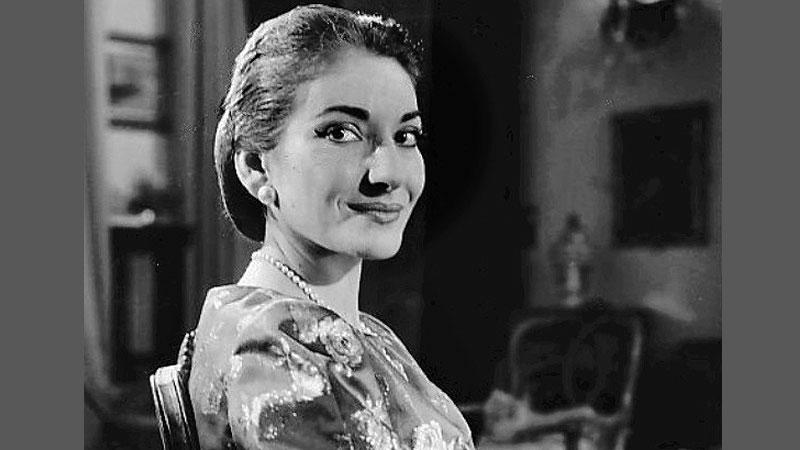
Maria Callas (December 2, 1923 – September 16, 1977) was an American-born Greek soprano. She was one of the most renowned and influential opera singers of the 20th century.
Many critics praised her bel canto technique, wide-ranging voice and dramatic interpretations. Her repertoire ranged from classical opera seria to the bel canto operas of Donizetti, Bellini and Rossini and, further, to the works of Verdi and Puccini; and, in her early career, to the music dramas of Wagner. Her musical and dramatic talents led to her being hailed as La Divina (‘the Divine one’).

Born in Manhattan to Greek immigrant parents, she was raised by an overbearing mother who had wanted a son. Maria received her musical education in Greece at age 13 and later established her career in Italy.
Forced to deal with the exigencies of the 1940s wartime poverty and with near-sightedness that left her nearly blind onstage, she endured struggles and scandal over the course of her career. She notably underwent a mid-career weight loss, which might have contributed to her vocal decline and the premature end of her career.
The press exulted in publicising Callas’s temperamental behaviour, her supposed rivalry with Renata Tebaldi and her love affair with Greek shipping tycoon Aristotle Onassis. Although her dramatic life and personal tragedy have often overshadowed Callas the artist in the popular press, her artistic achievements were such that Leonard Bernstein called her “the Bible of opera”.
Important debuts
Although by 1951, Callas had sung in all the major theatres in Italy, she had not yet made her official debut at Italy’s most prestigious opera house, Teatro alla Scala in Milan. According to composer Gian Carlo Menotti, Callas had substituted for Renata Tebaldi in the role of Aida in 1950, and La Scala’s general manager, Antonio Ghiringhelli, had taken an immediate dislike to Callas.
The night of the day she married Meneghini in Verona, she sailed for Argentina to sing at the Teatro Colón in Buenos Aires. Callas made her South American debut in Buenos Aires on May 20, 1949, during the European summer opera recess.
Her Metropolitan Opera debut, opening the Met’s seventy-second season on October 29, 1956, was again with Norma, but was preceded with an unflattering cover story in Time magazine, which rehashed all of the Callas clichés, including her temper, her supposed rivalry with Renata Tebaldi and especially her difficult relationship with her mother. On November 21, 1957, Callas gave a concert to inaugurate what then was billed as the Dallas Civic Opera, and helped establish that company.
In 1958, a feud with Rudolf Bing led to Callas’s Metropolitan Opera contract being cancelled. Impresario Allen Oxenburg realised that this situation provided him with an opportunity for his own company, the American Opera Society, and he accordingly approached her with a contract to perform Imogene in Il pirata.
She accepted and sang the role in a January 1959 performance that according to opera critic Allan Kozinn “quickly became legendary in operatic circles”. Bing and Callas later reconciled their differences, and she returned to the house in 1965 to sing the title role in two performances.
The Callas sound
Callas’s voice was and remains controversial; it bothered and disturbed as many as it thrilled and inspired.
During ’The Callas Debate’ Italian critic Rodolfo Celletti stated, “The timbre of Callas’s voice, considered purely as sound, was essentially ugly: it was a thick sound, which gave the impression of dryness, of aridity. It lacked those elements which, in a singer’s jargon, are described as velvet and varnish... yet I really believe that part of her appeal was precisely due to this fact. Why? Because for all its natural lack of varnish, velvet and richness, this voice could acquire such distinctive colours and timbres as to be unforgettable.”
However, in his review of Callas’s 1951 live recording of I vespri siciliani, Ira Siff writes, “Accepted wisdom tells us that Callas possessed, even early on, a flawed voice, unattractive by conventional standards — an instrument that signaled from the beginning vocal problems to come. Yet listen to her entrance in this performance and one encounters a rich, spinning sound, ravishing by any standard, capable of delicate dynamic nuance.”
Callas herself did not like the sound of her own voice; in one of her last interviews, answering whether or not she was able to listen to her own voice, she replies,
“Yes, but I don’t like it. I have to do it, but I don’t like it at all because I don’t like the kind of voice I have. I really hate listening to myself! The first time I listened to a recording of my singing was when we were recording San Giovanni Battista by Stradella in a church in Perugia in 1949. They made me listen to the tape and I cried my eyes out. I wanted to stop everything, to give up singing... Also now even though I don’t like my voice, I’ve become able to accept it and to be detached and objective about it so I can say, “Oh, that was really well sung,” or “It was nearly perfect.”
